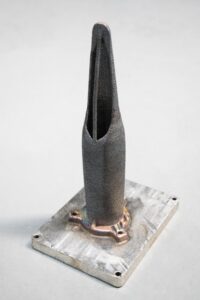10/08/23

A concrete bagging nozzle is a device used to fill bags with concrete or other similar materials. It is typically attached to the end of a hose and is used to direct the flow of concrete into the bag, ensuring a precise and even filling.
The nozzle typically consists of a funnel-shaped opening that tapers down to a smaller outlet, which is inserted into the bag. Some models may also feature a valve that allows for greater control over the flow of concrete.
Its design usually has a small stick passing across the narrowest part named as spear. This feature helps to break up any blockages in the nozzle since the concrete is a thick and heavy material and sometimes can get stuck or clogged in the nozzle, ensuring a smooth and efficient bagging process.
 Printing Parameters
Printing ParametersGenerating the g-code with Meltio Horizon offers the advantage of selecting specific points where the printing should pause or the moment to retract the wire during the printing, leading to increased process efficiency by minimizing unnecessary pauses, ergo applying the pause only for the thinner features such as the spear of the Concrete Bagging Nozzle.
Concrete nozzles are typically made of high-quality steel, which is durable and can withstand the high pressure and abrasive nature of the concrete as it is being pumped or sprayed.
One of the most common grades of stainless steel used in the construction industry is the 316 Stainless Steel, a higher-grade that has superior corrosion resistance compared to 304 stainless steel. It is often used in applications where the concrete will be exposed to harsh environments, such as marine or coastal environments.
Concrete bagging nozzles are versatile tools commonly used in the construction industry, landscaping, and DIY projects. Their primary application is to ensure a controlled and uniform flow of concrete when filling bags. They are also used for filling sandbags, packaging materials like soil or gravel, and facilitating bulk material transfer. In summary, these nozzles are essential for various applications in different industries, ensuring efficient and accurate filling processes.
Traditionally, a concrete nozzle is manufactured by the machining process. While machining is a common method for manufacturing concrete nozzles, other manufacturing methods, such as casting or forging, may also be used depending on the material and design requirements.
| Consumable | Quantity | Price | Cost |
| Material Shield Gas
Electricity |
2.11 kg
5.57 m³ 23.22 kWh |
17.5 €/kg
4.50 €/m³ 0.24 €/kWh |
36.89 €
25.08 € 5.57 € |
Print cost 67.55 €
| Consumable | Quantity | Price | Cost |
| Material Shield Gas
Electricity |
2.11 kg
5.57 m³ 23.22 kWh |
17.5 €/kg
2.38 €/m³ 0.24 €/kWh |
36.89 €
13.27 € 5.57 € |
Print cost 55.73 €